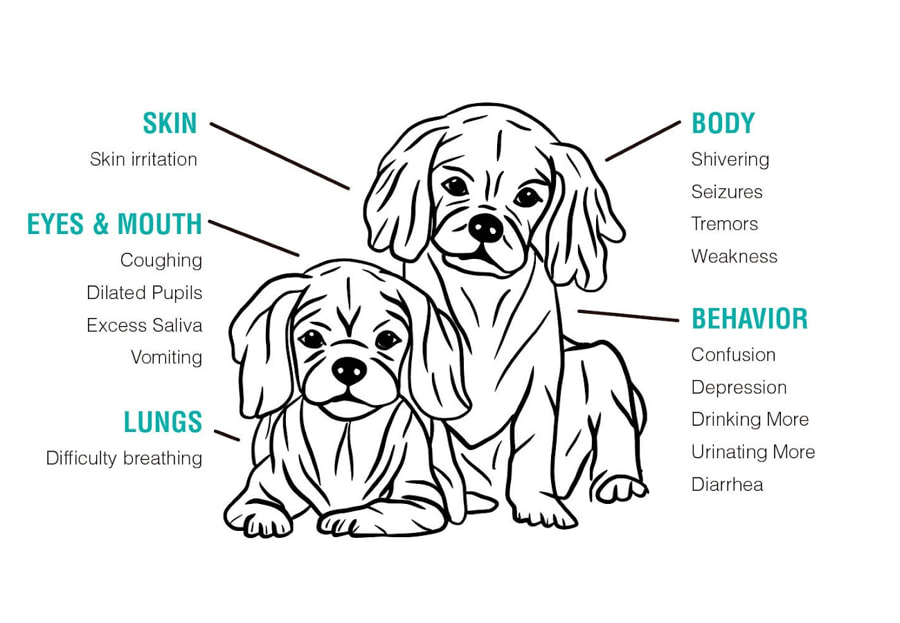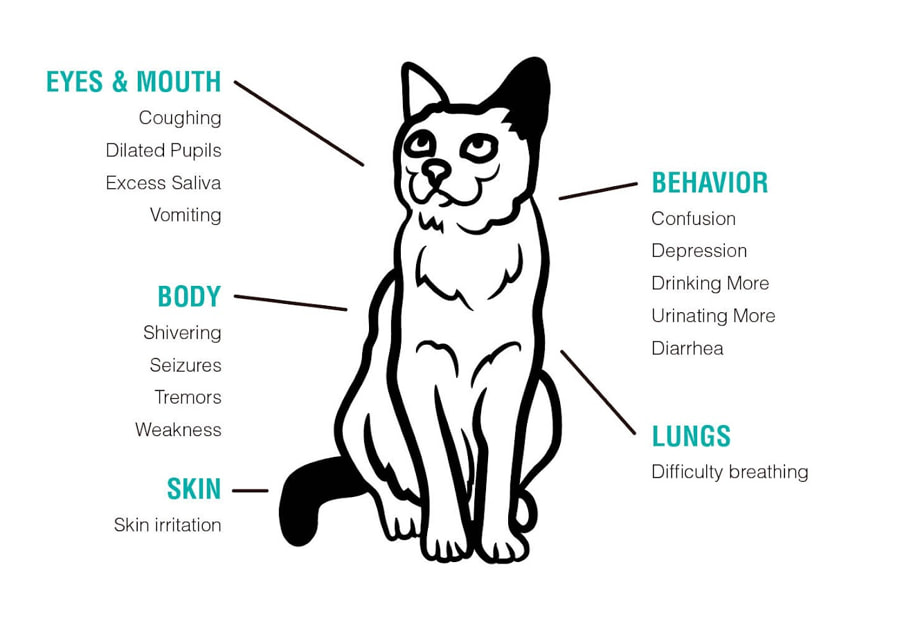If you think your pet has been poisoned, immediately call your local veterinarian or after hours, your nearest Emergency Veterinary hospital. Also contact the Animal Poison Control center:
Unfortunately pets ingestion toxins fairly frequently and depend on the type and amount of toxin that is ingested the signs can be minimal to very severe. If your pet does ingest a known toxin it is important to have your pet evaluated by a veterinarian and to bring along any information that you have regarding what was ingested. Knowing both the type and amount of toxin is very important to help determine what, if any significant signs will arise. Unfortunately for the majority of toxins there is no specific antidote and the majority of treatment relies on early intervention, decontamination (removing/binding the substance), supportive care (hospitalization, GI protective medications, intravenous fluids) and monitoring of various organ parameters.
Specific treatments include inducing vomiting if the toxin was recently ingested and giving your pet a dose or doses of activated charcoal. Activated charcoal is a substance that will help bind various toxins in the GI tract and prevent further absorption. Both of these treatments are important to help reduce the overall dose and hopefully reduce the severity and duration of any clinical signs.
Top Dog Hazards
Chemicals
Insecticides
Rodenticides
Cleaning products
Heavy metals
Fertilizer
Detergents
Antifreeze
De-icers
Plants
Aloe Vera
Ivy
Jade
Dumb Cane
Philodendron
Pathos
Sago Palm
ZZ Plant
Human Foods
Chocolate
Coffee
Grapes
Macadamia nuts
Onions
Garlic
Alcohol
Avocados
Chicken bones
Other Hazards
Batteries
Toys with small pieces
Fabric softener sheets
Rawhide dog chews
Human medicines unless prescribed by your veterinarian
Veterinary medicines unless prescribed to your pet
Dog Symptoms to Look For
Look out for the following symptoms that may indicate your dog has been exposed to a toxic substance. The accompanying image provides a visual guide, highlighting specific areas of your dog’s body where symptoms might manifest. Recognizing these signs is crucial for timely and effective intervention to ensure the well-being of your pet.

Top Cat Hazards
Human Medicine
Antidepressants
Cancer Medicines
Cold Medicines
Diet Pills
Pain Relievers
Vitamins and other supplements
Indoor & Outdoor Plants
Aloe
Azalea
Chrysanthemum
Hyacinths
Lily
Marijuana
Mistletoe
Rhododendron
Sago Palm
Tulip
Human Foods
Alcohol
Caffeine
Chives
Chocolate
Garlic
Grapes
Onions
Raisins
Xylitol
Yeast Dough
Other Hazards
Dog flea and tick medication
Chicken Bones
Dental floss, yarn or string
Holiday decorations
Toys with small movable parts
Cat Symptoms to Look For
Look out for the following symptoms that may indicate your cat has been exposed to a toxic substance. The accompanying image provides a visual guide, highlighting specific areas of your cat’s body where symptoms might manifest. Recognizing these signs is crucial for timely and effective intervention to ensure the well-being of your pet.

What to expect if your pet ingests these six common toxins:
Chocolate is toxic to dogs. That being said, dark and semi-sweet chocolates are much more toxic than milk chocolate. And white chocolate is not toxic, as it does not actually contain any chocolate. When enough chocolate is ingested it can cause vomiting, diarrhea, hyperactivity, rapid heart rate and arrhythmias, high blood pressure, tremors, and seizures. Usually side-effects will occur within the first few hours and last 12-24 hours, but this is variable depending on the amount and type of chocolate ingested. If ingestion recently occurred a veterinarian can induce vomiting, administer activated charcoal, and sometimes hospitalize your pet to monitor and treat the toxic effects of chocolate. When these recommendations are followed chocolate ingestion is rarely fatal.
Xylitol, also known as wood sugar, birch sugar, and birch bark extract, is a sugar substitute that is becoming more common in human foods and products. It is not toxic to humans, but is toxic to dogs. Common products that xylitol is found is include sugar free gums, some mints, toothpastes and some specialty peanut butters among others. What xylitol does is cause a sharp increase in insulin secretion leading to a very rapid drop in dog’s blood sugar. This can show up as severe lethargy, weakness, difficulty walking or being wobbly, or seizures. It can also lead to liver damage and even acute liver failure if high enough doses are ingested. Treatment often involves inducing vomiting and hospitalization for monitoring and treating low glucose levels. Often a liver protectant (Denamarin) will be used to help treat any possible underlying liver damage. The prognosis is often good with early treatment for the low blood sugar, but if severe hepatic damage occurs it can be fatal.
There are several different types of rat/mouse poison that are available. Unfortunately all the types are toxic to your pets. The most common type is a Coumadin based (vitamin K antagonist), which acts on the coagulation system and prevents the body from clotting effectively. If ingested this can cause significant bleeding which can manifest as lethargy, collapse, bloody vomit or stool, or difficulty breathing (bleeding into the lungs or thoracic cavity). Typically clinical signs/bleeding occurs about 48 hours after ingestion. This delay is due to the reserve of clotting factors in the body, but early decontamination and treatment is paramount in preventing significant clinical signs. Vitamin K is the mainstay of treatment and is used for several weeks to counteract the action of the rat poison. If bleeding does occur then hospitalization for blood and plasma transfusions are typically necessary. The prognosis is often very good especially if ingestion is caught early, but if left untreated then rat poison can be fatal. There are several other types of rat/mouse poison, so it is very important that if your pet ingests a poison that the box or label be brought in so that the active ingredients are known and allow for proper treatment.
Grapes and raisins cause an indiosyncratic toxicosis in dogs. This means that we don’t know what the mechanism of toxicosis is and not all dogs are sensitive to the toxicity. Because we cannot predict which dogs will experience the toxicity and because it does not appear to be dose-related, the recommendation for any grape or raisin ingestion is to be seen immediately by a veterinarian. Treatment consists of inducing vomiting, administration of activated charcoal, and 48 hours of hospitalization with IV fluids. These treatments are used to try to prevent the toxicity which causes acute kidney failure which can be fatal. In most, if not all cases, appropriate treatment results in an excellent prognosis for the pet.
Marijuana is toxic to animals and will cause changes in pet’s behavior and neurologic state. If ingested it will often causes dogs to act abnormal, become ataxic (wobbly, drunk walking), hyper-reactive to stimuli, hypothermic, bradycardic (low heart rate), and potentially very lethargic or comatose. In severe cases coma and respiratory depression can occur. Treatment for marijuana toxic typically involves hospitalization for decontamination with vomiting and activated charcoal (if clinically appropriate), intravenous fluids, temperature and heart rate support, along with monitoring your pet’s heart rate, mentation, and respiration. Typically the prognosis is very good and most animals recover over 24-48 hours with appropriate supportive care. It is very important to be truthful and upfront with your veterinarian if your pet potentially ingested any illicit drugs, as this will dictate what treatment and diagnostics that we may want to perform and is in the best interest of your pet.
Lilies are extremely toxic to cats. Any part of the lily (stem, petal, pollen, leaf) can be harmful to your cat, and the exposure is not dose dependent. This means that even if only a small portion of the lily was ingested, your cat can experience the poisonous effect. Lilies cause acute renal (kidney) failure in cats and this damage can be irreversible. If you suspect that your cat ate a part of a lily, the safest thing to do is to bring your cat into the hospital. If you can remember to do so, bring the flower (or take a picture of it) into the hospital to show the doctor. Treatment includes decontamination (inducing vomiting, administering medications to bind to the toxin), baseline bloodwork, and hospitalization for IV fluid therapy for 48-72 hours. Some cats require dialysis, particularly if they have signs of kidney injury on their initial bloodwork. Prognosis for cats who eat lilies is good, particularly when the toxin ingestion is caught early.
If you are concerned that your pet may have ingested a toxic substance you should contact your veterinarian or the ASPCA Animal Poison Control (888-426-4435) to determine if the amount ingested is toxic or will cause any significant problems. The ASPCA poison control website has a plethora of information about toxins.
More information is available at https://www.aspca.org/pet-care/animal-poison-control.